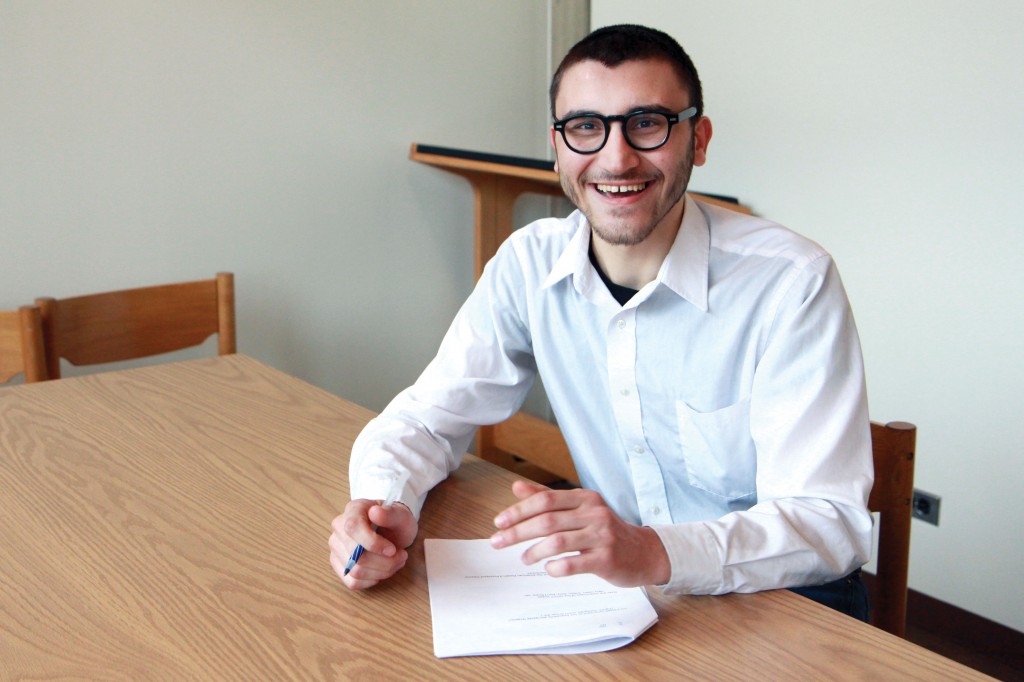
A newly launched campus organization hopes to improve Binghamton University’s academic environment by streamlining research projects and picking the student body’s brain.
The Institute for Student Research and Polling (ISR) is a non-chartered student organization running in conjunction with the Student Association, that promises to provide research opportunities to University students and student groups.
ISR is the only research institute run by students within the SUNY system, according to Aleksandar Vukasinovic, a sophomore triple-majoring in integrative neuroscience, computer science and political science.
The organization was conceived at the start of last semester by Vukasinovic, SA Executive Director David Hagerbaumer and Jonathan Krasno, a professor in the political science department.
ISR will work with the University, professors, undergraduates and graduate students to increase student participation in research, enable students to conduct their own studies and speed up the current scientific polling conducted by professors.
Any student or student group can commission a survey through the ISR, free of charge.
“Clients,” as Hagerbaumer calls them, will reach an agreement with the Institute regarding the surveys with an understanding that the results of all research are public information.
ISR will poll for everything from basic feedback to understanding students’ political positions.
“Ultimately we are hoping on an annual basis, the students involved in the Institute will publish their research,” Hagerbaumer said. “Students will have an opportunity to do research, write articles based on the research and will be able to publish them as well as work with the University.”
ISR Director Vukasinovic was enrolled in “PLSC340: Public Opinion,” a class taught by Krasno in which Vukasinovic was tasked with conducting polls. Vukasinovic sought a simpler way to gather his research and looked to conduct scientific polling on a grander and more public level.
With the aid of Hagerbaumer and Krasno, Vukasinovic decided to create a polling institution for the benefit of the student body, a one-stop shop for all polling and research needs.
Vukasinovic said the Institute will set BU apart, in terms of its research resources.
“Here we have a unique structural interplay between professors and students,” Vukasinovic said. “It is exciting that it is at this stage. It has a lot of potential and it’s our responsibility to fill it. It is a great opportunity for people who wanted to do research but didn’t have the vehicle to do so.”
The next step of the process relied on finding a base of operations for ISR, according to both Hagerbaumer and Vukasinovic.
It was agreed that the Institute should function under the SA as part of the larger umbrella organization, but there was some concern that if it were attached to a particular member of the SA Executive Board’s office, biases would affect the research.
To avoid conflict, the ISR will exist as a part of Hagerbaumer’s office, who as executive director, is an adult employee of the SA who works with the entire organization.
“ISR is established as an ongoing function of the SA, free from any single bias,” Hagerbaumer said. “Everything the SA does is about improving student life at the University. Now we can actually go out and find out where students need improvement in their quality of life.”
The backbone of the Institute is online scientific polling. For now, every poll is run by a team of about four to five students and one faculty member. Roughly 1,200 students will be polled at random, to ensure validity and avoid sampling the same students repeatedly.
The content of the Institute’s initial polls has ranged from global to local. The first three surveys, which will roll out next week, concern Israel, the 2012 presidential election and the Off Campus College Transport bus service, according to Heidi Zhang, a junior majoring in biology and member of ISR.
However, scientific polling is only one element of the Institute. The other element, the Marketing and Research division, is headed by Simone Thomas, a junior majoring in psychology, along with Zhang.
This section will compile a comprehensive database of all research opportunities available on campus, whether it is with faculty members or graduate students working on a thesis or dissertation.
The end goal is for a searchable database for the student body.
“Currently, there isn’t a website you can go to or a place on campus where they provide you with all the available research opportunities,” Thomas said. “If all goes according to plan, using our database will more efficiently match qualified students with research positions on campus.”
The Institute will provide a comprehensive list of available research positions on campus, with descriptions of the position and its application requirements. The resources are currently in the preliminary stages. The Institute also hopes to develop a website and publish a magazine to make the research results public, according to Vukasinovic.
“Although the database/bank are our hallmark innovations, we do value research analysis and survey compilations as equally important,” Zhang said.
Since last semester, ISR has gathered approximately 30 student members and a number of faculty members to work on advancing research at the University.
More information is available by contacting research@binghamton.org. The Institute’s General Interest Meeting will be held from 4 to 5 p.m. on Saturday, Feb. 25 in New University Union room 324.


